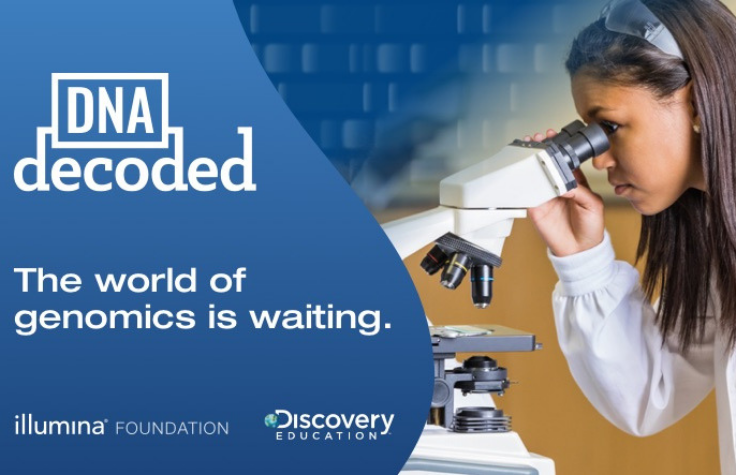
20 February 2019
This week, Illumina Foundation and Discovery Education launched a new program to encourage kids to embrace genomics and pursue STEM careers. Called DNA Decoded, this free online platform provides digital resources, classroom curricula and teacher development materials to support genomic education in K-12 classrooms across the country and help kids see genomics in their everyday lives.
Sharing this knowledge is critically important. Consumers are leveraging genomics to trace ancestry and gauge disease risk. Clinicians are adopting it to better understand cancer, diagnose rare diseases and conduct non-invasive pregnancy tests. Genomics is influencing farming, criminal justice, foodborne illness investigations, archaeology…the list goes on.
DNA Decoded empowers teachers with new ideas to bring genomics in their classrooms. Students across the country will study how genes work and how genomics can solve real-world problems, like fighting sickle cell disease, cancer and other conditions and even boosting the world’s food supply. Units are designed to meet Next Generation Science Standards and help students learn that genomics is more than learning about ancestry and specific genetic traits – it could be a career.
The bigger picture
DNA Decoded is just one of several programs the Illumina Foundation and Illumina are supporting to boost genomic literacy. High school students regularly tour our San Diego headquarters to learn about genomic science and careers, and we also give our employees resources to go into a local classroom to talk about genomics. Every year, the Illumina Foundation sponsors the San Diego Festival for Science and Engineering as well as the Cambridge Science Festival to spread the word on genomics and other STEM topics.
We also know that giving teachers and students the right tools can make a big impact. That’s why last summer, we brought 22 high school biology teachers to our San Diego campus for an intensive, two-day workshop. We wanted to give them the intellectual and physical tools to bring genomics to the classroom, even lending them an iSeq so students could perform actual sequencing.
During the workshop, teachers learned about the technology that powers Illumina instruments, bioinformatics and the many different careers needed to run a company like Illumina. Not just molecular biologists, mathematicians and engineers but attorneys, public affairs specialists and supply chain professionals.
We recently touched based with two teachers who implemented the program in their classrooms: Jessica Bosch at University City High School and Rachel Tenenbaum at La Jolla.
“When I got the sequencer in my classroom,” said Bosch, “it was like Christmas for me.”
Bosch was impressed by the creativity her students brought to the project. One of the steps required using a magnet to pull out the supernatant (the solution after the DNA has been separated), but the students were having trouble making it work.
“One of the students asked: Why can’t we color the supernatant so it’s easier to see and take out?” Bosch told us. “I was impressed with the kids because they had some great ideas on how to improve it. They came up with thoughtful ways to innovate in the lab.”
By coincidence, an actual E. coli outbreak was big news at the time, pressing home the lab’s relevance. The unit allowed students and teachers to see behind the curtain.
“This technology was out of reach,” said Tenenbaum, “I didn’t even know it was something we could do. But it’s possible for students to see how to sequence, prep for sequencing and do it in a way that makes it real for them. And it may have opened a few eyes in terms of careers.”
For more information, visit www.DNADecoded.org and be sure to stay up to date by signing up for the latest news and updates.


